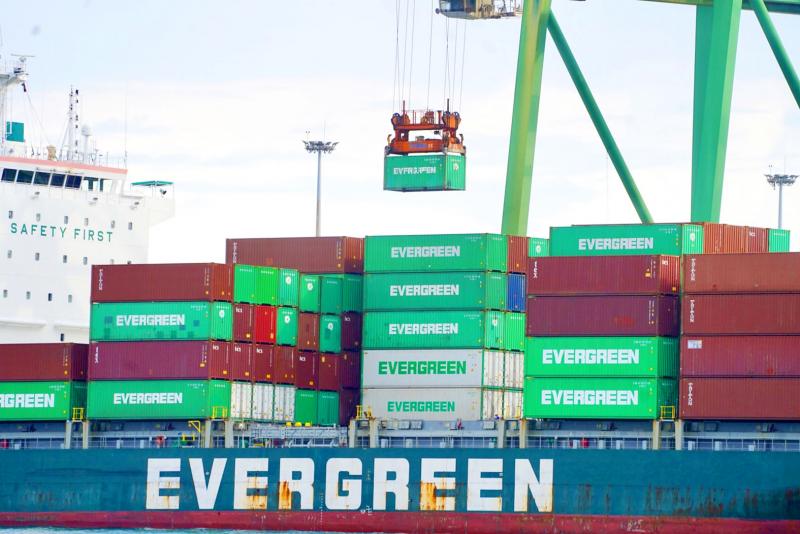Taiwan’s economy would grow 3.6 percent this year and 2.5 to 3 percent next year, Standard Chartered Bank Taiwan (渣打台灣) forecast yesterday, saying there are no signs of recession.
The slower GDP growth next year would be due to weakening demand in the US and Europe, even though exports to China would improve from this year, Standard Chartered chief economist Tony Phoo (符銘財) told a news conference.
The US economy is predicted to grow 0.3 percent next year, compared with 2.1 percent this year, and the European economy is forecast to grow 0.4 percent next year, compared with 2.3 percent this year, Phoo said.

Photo: CNA
Taiwan should continue to relax border controls to attract foreign tourists and boost domestic consumption, Phoo said, citing Thailand’s strong GDP growth on recovering tourism.
Despite the emergence of new variants of SARS-CoV-2, Taiwan has reached a high COVID-19 vaccination rate and can continue to ease its social distancing measures to boost private consumption, he added.
“Strong private consumption should help cushion the damage posed by weaker exports next year. Therefore, we see no signs of recession ahead,” Phoo said.
The central bank is expected to stop raising its policy rates next year after inflation abates, he said.
The bank said slowing exports to China could be a drag on the local economy in the second half of the year, as Chinese consumer demand remains weak amid Beijing’s “zero COVID-19” policy and lockdown measures.
“There is a slim chance that China would abandon its zero COVID-19 policy by the end of this year, as many rural areas support this policy,” Becky Liu (劉潔), a Hong-Kong based strategist at Standard Chartered, told the event via videoconference.
Since February, almost all first-tier cities have seen the virus spread continuously, and almost every day there is a small community facing new lockdown measures, Liu added.
The lockdown measures caused China’s import growth to slow in the first half of this year from a year earlier, she said, adding that the situation is unlikely to improve greatly in the second half.

CHIP RACE: Three years of overbroad export controls drove foreign competitors to pursue their own AI chips, and ‘cost US taxpayers billions of dollars,’ Nvidia said China has figured out the US strategy for allowing it to buy Nvidia Corp’s H200s and is rejecting the artificial intelligence (AI) chip in favor of domestically developed semiconductors, White House AI adviser David Sacks said, citing news reports. US President Donald Trump on Monday said that he would allow shipments of Nvidia’s H200 chips to China, part of an administration effort backed by Sacks to challenge Chinese tech champions such as Huawei Technologies Co (華為) by bringing US competition to their home market. On Friday, Sacks signaled that he was uncertain about whether that approach would work. “They’re rejecting our chips,” Sacks

NATIONAL SECURITY: Intel’s testing of ACM tools despite US government control ‘highlights egregious gaps in US technology protection policies,’ a former official said Chipmaker Intel Corp has tested chipmaking tools this year from a toolmaker with deep roots in China and two overseas units that were targeted by US sanctions, according to two sources with direct knowledge of the matter. Intel, which fended off calls for its CEO’s resignation from US President Donald Trump in August over his alleged ties to China, got the tools from ACM Research Inc, a Fremont, California-based producer of chipmaking equipment. Two of ACM’s units, based in Shanghai and South Korea, were among a number of firms barred last year from receiving US technology over claims they have

It is challenging to build infrastructure in much of Europe. Constrained budgets and polarized politics tend to undermine long-term projects, forcing officials to react to emergencies rather than plan for the future. Not in Austria. Today, the country is to officially open its Koralmbahn tunnel, the 5.9 billion euro (US$6.9 billion) centerpiece of a groundbreaking new railway that will eventually run from Poland’s Baltic coast to the Adriatic Sea, transforming travel within Austria and positioning the Alpine nation at the forefront of logistics in Europe. “It is Austria’s biggest socio-economic experiment in over a century,” said Eric Kirschner, an economist at Graz-based Joanneum

BUBBLE? Only a handful of companies are seeing rapid revenue growth and higher valuations, and it is not enough to call the AI trend a transformation, an analyst said Artificial intelligence (AI) is entering a more challenging phase next year as companies move beyond experimentation and begin demanding clear financial returns from a technology that has delivered big gains to only a small group of early adopters, PricewaterhouseCoopers (PwC) Taiwan said yesterday. Most organizations have been able to justify AI investments through cost recovery or modest efficiency gains, but few have achieved meaningful revenue growth or long-term competitive advantage, the consultancy said in its 2026 AI Business Predictions report. This growing performance gap is forcing executives to reconsider how AI is deployed across their organizations, it said. “Many companies